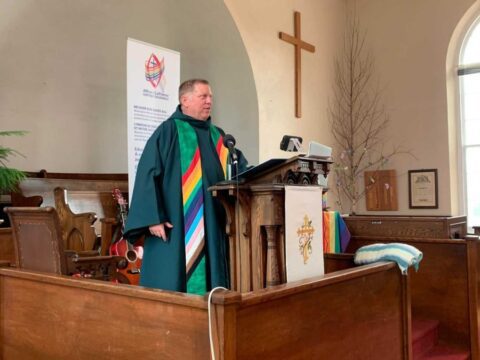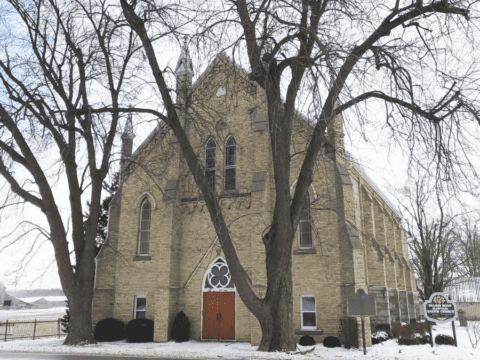The president of the United Church’s would-be union group has forwarded a proposal to the upcoming General Council 45 to address a perceived lack of attention to the rights of clergy in the workplace, specifically during disputes.
The “Faith Workers Bill of Rights” includes 10 items on the rights of “faith workers” to respect and a safe workplace. Unifaith, which created the document, is a community chapter of Unifor — Canada’s largest private-sector trade union. Its aim is to unionize United Church clergy and staff. The group developed the bill of rights as a response to clergy bullying and harassment concerns published in a 2024 Broadview article and also as a step toward union certification. The proposal defines “faith workers” as all United Church of Canada employees, excluding those working for the General Council Office or the Office of Vocation, but with a special focus on clergy.
You may unsubscribe from any of our newsletters at any time.
“Based on the experiences of many faith workers in The United Church of Canada, this Bill of Rights was created in order to ensure a positive, supportive working environment within Communities of Faith,” the document, prepared in collaboration with the Canadian Institute of Workplace Harassment and Violence, reads. “Let this Bill of Rights declare foundational principles necessary to protect those who lead in faith. These rights do not elevate faith workers above others — they affirm that no one is beneath protection, dignity or justice, including those who serve.”
Below: Read the full text of the Faith Workers Bill of Rights
Faith-Workers-Bill-of-Rights-ProposalSince Unifaith started in 2014, one of its main initiatives has been supporting clergy who are navigating employment negotiations or complaints with their congregations or the national church, according to Rev. Alison Miculan, Unifaith’s president, a minister at two United churches in Hamilton and a General Council 45 commissioner who submitted the proposal to the gathering for consideration. Over the past decade, she has identified gaps within the denomination’s internal procedures that she says marginalize clergy.
“All of the existing polity within The United Church of Canada is focused more on the responsibilities of clergy [….] You might pull out a sentence here or a fragment there, but there’s no real comprehensive place where you say these are the rights of faith workers,” Miculan said.
Many of the clauses in the bill of rights emphasize employees’ right to report misconduct and discrimination without fear of reprisal, the right to due process during complaint investigations, as well as the right to trauma-informed support, compensation and reintegration options when harmed. Miculan believes the Office of Vocation, the national body that handles the accreditation, oversight and discipline of ministers, has a “one-sided” approach to bullying and harassment complaints.
“When the Office of Vocation receives a complaint, the deck is pretty stacked against clergy,” Miculan said. “There isn’t a robust way of investigating parishioners. There’s no consequences essentially for congregations, whereas there are all kinds of consequences for clergy because you can lose your job.”
More on Broadview:
- How to grow a church
- 3 centenarians on what a lifetime of faith has meant to them
- United Church review to look at how well the restructured denomination is working
Rev. Jennifer Janzen-Ball, executive minister of the General Council’s theology and ministry leadership unit, which oversees the Office of Vocation, described the Faith Workers Bill of Rights as “quite comprehensive” and noted that it frames the denomination’s relations with ordered and lay clergy as an employee-employer relationship, and the church as a workplace setting.
However, she says the bill’s content only reiterates the church’s existing policies, “primarily our Creating Safe and Respectful Environments policy, but it’s also covered under our Manual in terms of the notice that must be given to ministry personnel when terminating a pastoral relationship and our Ethical Standards and then within our […] employee and family assistance plan and benefits package.”
She added that the church is actively working on a number of initiatives, namely a series of training modules that will be rolled out to congregations in the fall, as well as the United Fresh Start program, which provides workshops for clergy and congregational lay leaders in the first years of a new pastoral relationship.
Janzen-Ball further explained that while she doesn’t discount anecdotal reports of clergy bullying, the denomination needs more empirical data to learn the extent of the problem.
“We would like to gather data on how many ministers feel that they’re bullied because we don’t know,” Janzen-Ball said. “I just want to reiterate again that the church really does take seriously the need to address situations of harassment, of bullying, of discrimination, of abuse of any kind, and that we continue to be committed to that.”
At the time of article’s writing, the bill still awaits French translation before being added to the 45th General Council’s proposal library online. Miculan is hopeful that the business committee, the determining body setting the meeting’s agenda, will select the bill of rights to be heard and debated publicly when the General Council convenes in August.
“My biggest worry is that they will [defer it] because that’s how all good things die. I want this to be heard by the full court,” Miculan said. “My mantra is ‘working conditions are worshiping conditions’ so I think that taking care of our faith workers just benefits everybody, and I think that most of the people sitting in our pews feel the same way.”
EDITOR’S NOTE: This article has been updated to clarify Unifaith’s definition of faith workers, note that Alison Miculan submitted the proposal to General Council 45 as a commissioner and update our phrasing of “ordained and lay clergy” to “ordered and lay clergy.”
***
Ghazal Azizi is a summer intern at Broadview.















A valid and needed discussion.
Really, the Bill of Rights simply states that faith workers, like other workers covered by provincial employment standards, should have the same rights as others do.
If GC45 and General Council believe these are already available to faith workers, there should be no hesitation in passing this as they make these rights explicit. Either way, Churches should be encouraged to print and frame the Bill of Rights and place them on view in congregations and other places faith workers work.
As the Founder of the Canadian Institute of Workplace Bullying Resources, I fully support Rev. Alison Miculan’s advocacy for the Faith Workers’ Bill of Rights. Our team was honoured to collaborate on this initiative, which addresses a long-overdue need for trauma-informed, psychologically safe practices within church workplaces.
Alison is right, “working conditions are worshiping conditions.” When processes lack psychological safety and trauma-informed safeguards, they can cause more harm than the original conflict itself. Faith workers deserve the same dignity, protection, and due process as anyone in a workplace setting. This Bill of Rights is not about elevating clergy above others—it’s about ending the systemic oversight that has too often left them vulnerable.
We urge the General Council to give this bill the serious attention it deserves. Creating psychologically safe and equitable processes isn’t optional, it’s a moral responsibility.
The only possible way for Jennifer Janzen-Ball (“Executive Minister of the General Council’s Theology and Ministry Leadership Unit which oversees the Office of Vocation”) to not know [“we don’t know”] how many Clergy feel bullied in The United Church of Canada is to NOT WANT to know. With a job title as long as Janzen-Ball’s, I would think that she would have eyes and ears on what is happening across The Church in terms of cases that come to the OV. Unless she has ZERO honest communication with Office of Vocation colleagues across the denomination, and unless she asks absolutely no questions about how cases of Clergy bullying have been handled by the OV, then it is not possible NOT to know. The only way to not know is to not want to know. The United Church of Canada does NOT WANT to know; it does NOT WANT to support Clergy who have been bullied by Church Councils, Church Staff, Parishioners. Janzen-Ball’s words fail to state that the Church takes seriously the care of CLERGY in bullying and harassment situations; rather, the “Justice Church” does all it can to silence, demonize, belittle, blame, diminish, humiliate Clergy in situations where Clergy have been bullied – this has longlasting, devastating effects on Clergy and their families and, not surprisingly, Clergy leave the profession.
This article would benefit from some factual editing;
“Ordained and lay clergy” is not a category in the United Church of Canada, and specifically excludes Diaconal Ministers. You could say Ordered Ministry Personnel, or Ordered and Designated Lay Ministry Personnel, Ordered [Ordained and Diaconal Minsters] and Designed Lay Ministers, or if you’re meaning to include Licensed Lay Worship Leaders and [lay] Congregationally Designated Ministers, then an overarching term like “those in all paid accountable ministries” might work. Again, would need to define which categories are included or not. “Faith Worker” is not a category specific to the United Church, but to Unifaith.
Calling it a “New ‘Faith Workers’ Bill of Rights’” makes it sound like it is in force rather than Proposed.
Should be clear that complaints by Ministry Personnel (lay and ordered) about treatment of them in a Community of Faith are not the purview of the Office of the Vocation, but rather the Regional Councils. If you want a statement about how effective the current policies are in addressing this issue, asking a Regional Council would be appropriate.
Hi Marcie,
Thank you for your comment. Indeed, the article should say “ordered” instead of “ordained.”
We have also updated it to include Unifaith’s definition of faith workers.
Your comment about the headline is well taken as well.
Best,
Emma
Christian Ministry is a Divine calling, not a job. Matthew 25 is not about monetary investments, it’s about Spiritual investments.
“What then is my reward? That in my preaching I may present the gospel free of charge, so as not to make full use of my right in the gospel.” 1 Cor.9:18
“And a servant of the Lord must not quarrel but be gentle to all, able to teach, patient, correcting his opponents with gentleness. God may perhaps grant them repentance leading to a knowledge of the truth, and they may come to their senses and escape from the snare of the devil, after being captured by him to do his will.” 2 Tim 2:24-26
This is what I don’t see in the UCC leadership – “Here is a trustworthy saying: Whoever aspires to be an overseer desires a noble task.” 1 Tim 3:1 or “Be shepherds of God’s flock that is under your care, watching over them—not because you must, but because you are willing, as God wants you to be; not pursuing dishonest gain, but eager to serve” 1 Pet 5:2
Sadly it’s all about self, not others.
Excellent distillation of the overwhelming cultural messaging within which we serve, and with which we batter ourselves emotionally whilst shaking and crying on the way home from meetings.
If you MUST base your expectations of the clergy on the directions of Paul, perhaps you could at least note that he never stuck it out in congregational ministry, and all these fine expressions of “suck it up” were directed at those who DID.
(Also worth noting that he’d not have had to keep reiterating all these fine words if those sticking it out in congregational ministry weren’t quite obviously writing to him regularly about the awfulness they were enduring.)
It never ceases to amaze me how people insist on telling the clergy we’re not being sacrificial enough and we’re making it “all about self.” It’s as though you imagine we’re not constantly beating ourselves up about precisely both those things already. All the time.
So with respect, perhaps you could briefly turn away from Paul to focus on Jesus. Who recognized that some people’s awfulness was less precious to protect than the well-being of his disciples. Who clearly and deliberately directed them, when necessary, to say ‘no more’ and shake the dust from their feet. To Jesus, apparently, even the clergy are more precious than many sparrows.
I’ll give two commands that Christ gave His disciples.
Matthew 5:44-45 “Love your enemies and pray for those who persecute you, so that you may be sons of your Father who is in heaven. For he makes his sun rise on the evil and on the good, and sends rain on the just and on the unjust.”
Matthew 16:24-25 “Then Jesus told his disciples, “If anyone would come after me, let him deny himself and take up his cross and follow me. For whoever would save his life will lose it, but whoever loses his life for my sake will find it.” (ouch)
Take up his cross to anyone in Christ’s day meant certain death.
Is it a two way street? Yes, “Let the one who is taught the word share all good things with the one who teaches.” Galatians 6:6 “For it is written in the Law of Moses, “You shall not muzzle an ox when it treads out the grain.” Is it for oxen that God is concerned? Does he not certainly speak for our sake? It was written for our sake, because the plowman should plow in hope and the thresher thresh in hope of sharing in the crop. If we have sown spiritual things among you, is it too much if we reap material things from you? If others share this rightful claim on you, do not we even more? Nevertheless, we have not made use of this right, but we endure anything rather than put an obstacle in the way of the gospel of Christ. Do you not know that those who are employed in the temple service get their food from the temple, and those who serve at the altar share in the sacrificial offerings?” 1 Corinthians 9:9-14 this is also part of Paul’s instructions to Timothy.
I never said Pastoral work is easy, I know. If you treat it as a profession rather than a calling of God and proclaiming Christ as Saviour to a lost world, you’re bound for trouble.